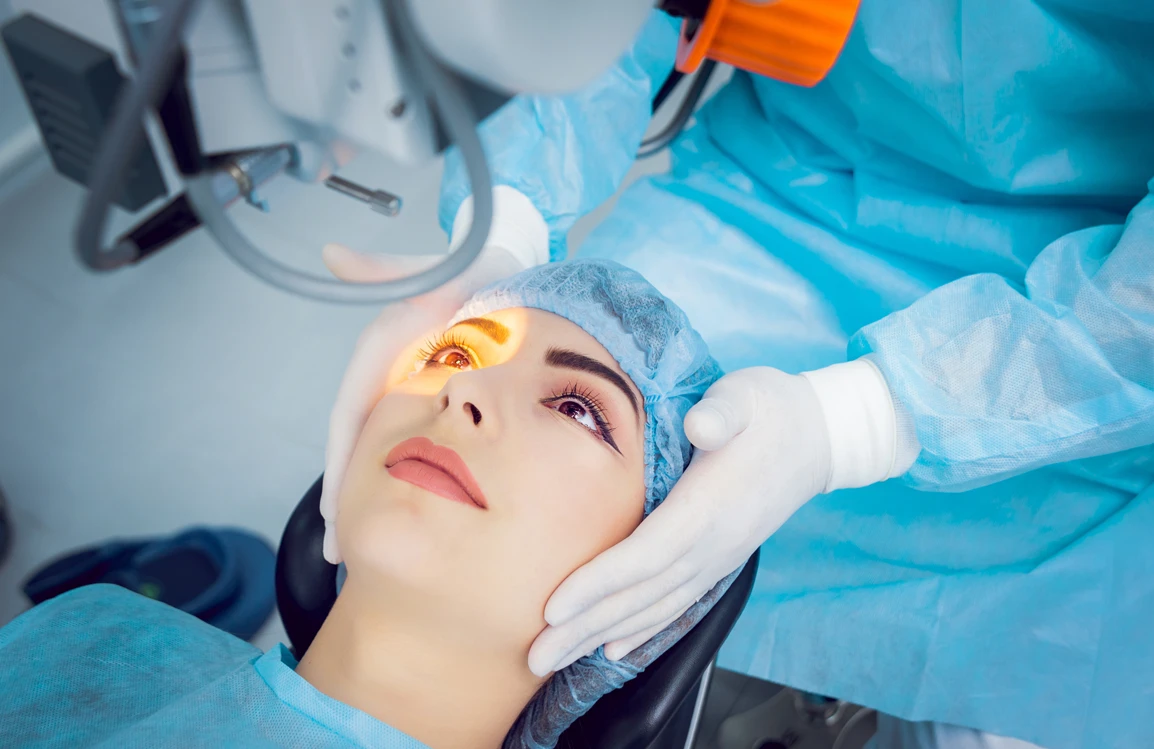Cataract Treatment in Scottsdale, AZ
Cataracts is an age-related vision condition that causes the eye’s clear lens to become clouded. This gradual clouding not only makes daily tasks—like driving and reading—more difficult to complete but can also cause permanent vision loss if left untreated. Schedule a consultation with Dr. Arora today to protect your vision.
What Is Cataract Treatment?
When it comes to cataracts, prevention is key. That’s why we encourage patients to schedule an annual eye exam at Arora Eye. This comprehensive eye exam enables our vision specialists to:
- Prevent the development of cataracts
- Detect and treat cataracts in their early stages
Prescription glasses and contacts can also help prevent further vision loss due to cataracts. If you suspect that you have cataracts, our team will assess your needs and see if you qualify for nonsurgical treatment. If your cataracts aren’t diagnosed until the later stages when vision loss is significant, surgery might be the best option.
Cataract Symptoms
Cataracts are frequently confused with dry eyes, glaucoma, and other vision conditions, but they are a unique type of vision loss. Unlike other common eye conditions, cataracts tend to cause a painless, gradual change in vision. If you have a cataract, you might have a cloudy or white eye and may notice the following symptoms:
Cloudy or blurred vision
Discomfort around bright light
Colors that appear faded
Difficulty seeing in dim light
Double vision
Halos around lights
Dry eyes
Cataract Specialist
While these symptoms can seem troubling, cataract-related vision loss is almost always reversible. Whether the answer is cataract surgery or another technique, the Arora Eye team will help you find the best treatment for your eyes.
See What Our Customers Have To Say
-
 LIFE CHANGER!!
LIFE CHANGER!!
My experience from beginning to the end was amazing. I definitely recommend Dr. Arora and his team.
 Erwin F.
Erwin F.
9/05/2023 Arora Eye has truly raised the bar when it comes to eye care with its impressive array of state-of-the-art medical equipment. Under the expert guidance of Dr. Jay Arora and… read more his dedicated team, the experience at Arora Eye is nothing short of exceptional. Their commitment to professionalism, combined with a genuine and welcoming attitude, makes every visit a truly positive and reassuring one.
Arora Eye has truly raised the bar when it comes to eye care with its impressive array of state-of-the-art medical equipment. Under the expert guidance of Dr. Jay Arora and… read more his dedicated team, the experience at Arora Eye is nothing short of exceptional. Their commitment to professionalism, combined with a genuine and welcoming attitude, makes every visit a truly positive and reassuring one.
It’s no surprise that Dr. Jay Arora’s outstanding expertise and contributions have earned him the well-deserved recognition in Newsweek’s 2021 America’s Best Eye Doctors. This accolade not only speaks to his immense knowledge in the field but also highlights the dedication he has towards his patients’ well-being. With Dr. Arora at the helm, you can trust that you’re in the hands of one of the finest eye doctors in the country.
Having personally experienced the exceptional service at Arora Eye, I can confidently say that I’ve become a staunch advocate. I’ve recommended their services to countless friends and family members, and without fail, they too have been thoroughly impressed by the level of care they received.
In a world where healthcare experiences can sometimes feel clinical and detached, Arora Eye stands out as a shining example of how personalized and compassionate care can make all the difference. Dr. Jay Arora and his team have mastered the art of combining advanced medical technology with warm human interaction, creating an environment that fosters trust and comfort. Without a doubt, Arora Eye has earned its place as a top-tier eye care destination, and I look forward to my continued relationship with them for all my eye care needs.
 Michael B.
Michael B.
8/22/2023 I had the pleasure to meet with Dr. Arora today and I am so happy! Dr. Jay Arora, and his staff are top notch, I give them 10 STARS! I… read more feel like my eye problems will be gone soon. Arora Eye has the latest state of the art medical equipment, and he and his staff is exceptionally courteous, knowledgeable and professional. I am sincerely grateful knowing that my eye health will be cured soon! Amen! Thank you Dr. Arora!
I had the pleasure to meet with Dr. Arora today and I am so happy! Dr. Jay Arora, and his staff are top notch, I give them 10 STARS! I… read more feel like my eye problems will be gone soon. Arora Eye has the latest state of the art medical equipment, and he and his staff is exceptionally courteous, knowledgeable and professional. I am sincerely grateful knowing that my eye health will be cured soon! Amen! Thank you Dr. Arora! 
 Diana A.
Diana A.
8/16/2023 -
 What an amazing experience! Ended up choosing Arora Eye for Lasik on the recommendation of a close friend and I’m so glad that I did. The entire staff is amazing.… read more The office is cozy and welcoming and they made everything feel easy.
What an amazing experience! Ended up choosing Arora Eye for Lasik on the recommendation of a close friend and I’m so glad that I did. The entire staff is amazing.… read more The office is cozy and welcoming and they made everything feel easy.
Leading up to the procedure, my brother ended up interested and we ended up getting our surgery on the same day. We are now both seeing better then 20/20 and couldn’t be happier!
Thank you Dr. Arora and team. Appreciate you guys!
 Cliff C.
Cliff C.
5/17/2023 Easily one of the best eye places I have been too since being in Arizona! Love how particular the Doc was when it came to surgery, double checking and triple… read more checking things beforehand and afterwards! Would recommend to everyone to come here if you have any eye problems or wanting to get lasik, best place is Arora Eye!
Easily one of the best eye places I have been too since being in Arizona! Love how particular the Doc was when it came to surgery, double checking and triple… read more checking things beforehand and afterwards! Would recommend to everyone to come here if you have any eye problems or wanting to get lasik, best place is Arora Eye! 
 Eli L.
Eli L.
5/02/2023
Reverse Cataracts With Cataract Surgery
If your cataracts have developed into the later stages, we recommend corrective surgery. Surgery removes the cataract by replacing the clouded lens with a clear, artificial lens. Depending on your specific vision needs, our team will recommend one of the following surgical treatments:
Phacoemulsification Surgery
During this procedure, Dr. Arora uses either ultrasound waves or a laser to separate the clouded cataract. He then suctions out the fragments through a small hole in the eye and inserts an artificial lens. This minimally-invasive approach is ideal for patients with mild cataracts.
Extracapsular Cataract Surgery
Extracapsular cataract surgery involves removing the lens in one piece through a larger hole and replacing it with a new, artificial lens to provide clearer vision.

Determining Cataract Candidacy
Most patients with cataracts qualify for cataract surgery. As long as your case has progressed enough to impact your ability to complete daily tasks, you can undergo cataract surgery. If you have further questions about whether you’re a good candidate, schedule a consultation with Dr. Arora.
What to Expect After Cataract Surgery
Cataract surgery is a quick, minimally-invasive procedure with a short recovery time. You might experience slight itching, blurring, or light sensitivity for two to three days after surgery. It takes eight weeks for your eyes to heal fully and for results to become apparent. Take it easy during your recovery to avoid straining or injuring your eyes. Dr. Arora might also recommend medicated eye drops to reduce infection risks and ensure a smooth recovery.
Scottsdale’s #1 Cataract Specialist
Do you want to prevent your eyes from developing cataracts? Start by scheduling a comprehensive eye exam at Arora Eye. Dr. Arora will examine your eyes closely to look for early signs of this vision condition. If any signs of cataracts are detected, Dr. Arora will walk you through your treatment options and develop a customized plan.




